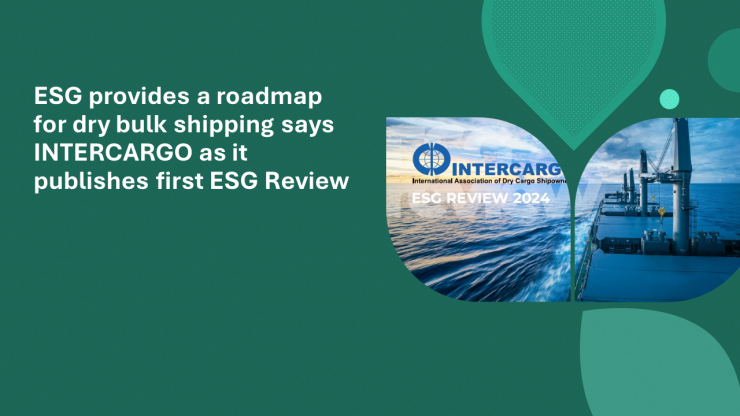Media Release – 30 April 2024
“ESG provides a roadmap for dry bulk shipping
says INTERCARGO as it publishes first ESG Review”
The evolving Environmental, Social, and Governance (ESG) agenda is not merely a prerequisite for operating in the dry bulk shipping industry of the 21st century; it is a roadmap for thriving amidst challenges and securing sustainable success, says The International Association of Dry Cargo Shipowners (INTERCARGO).
Summarising INTERCARGO’s newly published ESG Review, Kostas Gkonis, INTERCARGO Secretary General advised that “a forward-looking attitude is certainly required when addressing key aspects shaping the future of maritime operations and the dry bulk shipping sector more particularly.”
“Dry bulk shipping should embrace the ESG agenda as a catalyst for innovation, resilience, and long-term success and to effectively communicate its impact on and commitment to sustainability,” he said.
By proactively addressing environmental and social challenges, fostering robust governance practices, and embracing a purpose-driven culture, the dry bulk shipping sector can navigate present and future complexities, while charting a course toward sustainable prosperity for societies around the world, the ESG Review declares.
INTERCARGO’s first-ever ESG Review identifies key steps that the dry bulk shipping sector is taking in the fields of environment, social and governance. Highlighting safety as both a key priority and an area of increasing success, the report points to significant improvements to dry bulk ship safety over the past decade, achieved alongside substantial growth in the global dry bulk fleet.
Dr Gkonis pointed out: “Seafarers’ well-being tops the list of our priorities. Ensuring their safety and welfare is imperative for our sector’s future. People remain the cornerstone of our business model and success.”
Decarbonisation stands out as a paramount environmental challenge for ship operators in the dry bulk shipping sector, alongside other environmental concerns such as waste management, hazardous materials disposal, and ballast water impacts. With Non Governmental Organisation status at the International Maritime Organization (IMO), INTERCARGO is working proactively towards shipping’s 2050 net zero goals and in particular to deliver decarbonisation with safety. Dr Gkonis commented: “While technological uncertainties persist, embracing innovation is essential. Moreover, prioritising talent development and fostering a culture of innovation are critical for attracting and retaining top talent to meet the demands of the future.”
Dr Gkonis observed: “A clear sense of purpose, coupled with robust governance structures, is crucial for fostering a sustainable and resilient business model, ultimately striving for stronger, safer, and more sustainable dry bulk shipping practices.”
INTERCARGO chairman Dimitrios Fafalios commented: “INTERCARGO’s ESG Review highlights that ESG has become an increasingly important topic for all stakeholders in the dry bulk shipping community, such as investors, financiers, charterers, cargo owners, insurers, employees, and non-governmental organisations.”
INTERCARGO’s ESG Review (2024) is available here.
– END –
About INTERCARGO
International shipping is vital for the global economy and prosperity as it transports approximately 90% of world trade. The dry bulk sector is the largest shipping sector in terms of number of ships and deadweight. Dry bulk carriers account for 43% of the world fleet (in tonnage) and carry an estimated 55% of the global transport work. Please view our ESG Review here: https://www.intercargo.org/esg-review-2024/
The International Association of Dry Cargo Shipowners (INTERCARGO) unites and promotes quality dry bulk shipping, bringing together 250 forward thinking companies from 30 countries. INTERCARGO convened for the first time in 1980 in London and has been participating with consultative status at the International Maritime Organization (IMO) since 1993. INTERCARGO provides the forum where dry bulk shipowners, managers and operators are informed about, discuss, and share concerns on key topics and regulatory challenges, especially in relation to safety, security, the environment, and operational excellence. The Association promotes its members’ positions to IMO, as well as to other shipping and international industry fora, having free and fair competition as a principle.
For further information please contact: info@intercargo.org



